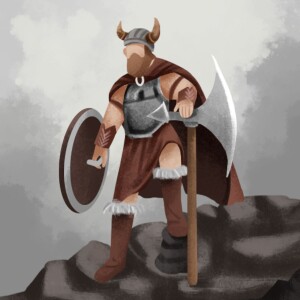
- Motives for conquest: Just as the Vikings sought to expand their territories and gain wealth through their conquests, modern imperial powers often have similar motivations for their actions, such as the desire for resources, land, and power.
- Use of military force: Both the Vikings and modern imperial powers have used military force to achieve their conquests. The Vikings were known for their fierce raids and battles, while modern imperial powers rely on military intervention to control and dominate other nations.
- Establishment of colonies: The Vikings established colonies in areas they conquered, such as Iceland, Greenland, and parts of England and France. Similarly, modern imperial powers have established colonies or territories in regions they have conquered, often using them for economic exploitation and resource extraction.
- Cultural assimilation: The Vikings often assimilated with the local populations in areas they conquered, adopting aspects of their culture and customs. In a similar way, modern imperial powers have imposed their culture and values on the populations of the regions they have conquered, leading to cultural assimilation and erasure of indigenous cultures.
- Resistance from indigenous populations: Both the Vikings and modern imperial powers have faced resistance from indigenous populations in the regions they have conquered. Indigenous people have fought back against imperial rule, seeking to maintain their own autonomy and self-governance.
Overall, the parallels between the Viking conquests and modern-day imperialism highlight the enduring nature of conquest and domination throughout history, as well as the impact it has had on the societies and cultures of the conquered regions.
What were the long-term consequences of the Viking invasions on European politics and culture?The Viking invasions had several long-term consequences on European politics and culture:
- Political decentralization: The Viking invasions led to the breakdown of central governments in areas they raided, leading to political decentralization and the rise of local rulers and feudalism in Europe.
- Cultural exchange: The Vikings brought new ideas, technologies, and cultural practices to Europe through their trading and raids, leading to a cultural exchange that influenced European art, language, and literature.
- Expansion of trade networks: The Viking invasions helped expand trade networks in Europe, as the Vikings established new trade routes and connections between different regions.
- Christianization: The Viking invasions also played a role in the spread of Christianity in Europe, as many Vikings eventually converted to Christianity and helped spread the religion to regions they had previously raided.
- Influence on architecture and settlement patterns: The Vikings' distinctive architecture and settlement patterns, such as their longhouses and defensive structures, had a lasting influence on European architecture and urban planning.
Overall, the Viking invasions had a significant impact on European politics and culture, shaping the development of the continent in the centuries that followed.
How did the Vikings' innovative shipbuilding techniques contribute to their success as raiders and traders?The Vikings' innovative shipbuilding techniques played a crucial role in their success as raiders and traders. Their advanced knowledge of naval architecture allowed them to build highly efficient and versatile ships that were able to navigate a variety of waterways, including shallow rivers and open seas. These ships, known as longships, were equipped with sail and oar power, making them fast and agile, which enabled the Vikings to quickly launch surprise attacks on coastal communities and trade routes.
Additionally, the Vikings' ships were constructed with overlapping planks and clinker-built hulls, which made them extremely durable and provided protection against harsh weather conditions and enemy attacks. The Vikings also utilized advanced navigational tools, such as the sunstone, to help them navigate safely across vast distances, allowing them to explore new territories, establish trade routes, and conduct successful raids on unsuspecting settlements.
Overall, the Vikings' mastery of shipbuilding techniques gave them a distinct advantage over their rivals and allowed them to expand their influence across the seas, establishing trade networks and raiding communities throughout Europe and beyond. Their ships were not only essential for transportation and trade but also served as powerful weapons that helped the Vikings to conquer new lands and establish a reputation as fearsome warriors and skilled seafarers.
More Episodes
 2024-04-14
2024-04-14
 10
10
 2024-03-31
2024-03-31
 11
11
 2024-03-23
2024-03-23
 13
13
Create your
podcast in
minutes
- Full-featured podcast site
- Unlimited storage and bandwidth
- Comprehensive podcast stats
- Distribute to Apple Podcasts, Spotify, and more
- Make money with your podcast
It is Free
- Privacy Policy
- Cookie Policy
- Terms of Use
- Consent Preferences
- Copyright © 2015-2024 Podbean.com






